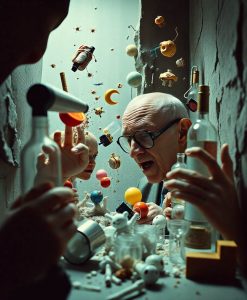Cellular Aging: A New Frontier of Human Potential
When we think about aging, most of us imagine wrinkles and slower reflexes. But what if the real story happens at a microscopic level we can’t even see? Emerging research from the University of Cambridge reveals something remarkable: our cells’ final moments might hold secrets to extending human vitality.
Our bodies are extraordinary ecosystems of constant renewal. Imagine each cell as a tiny worker maintaining an intricate biological infrastructure. Sometimes these workers don’t retire gracefully—they can rupture dramatically, triggering inflammation and tissue damage. This process, called necrosis, isn’t random background noise. It’s potentially a core mechanism underlying how we age, how diseases develop, and how our bodies deteriorate over time.
What makes this research so exciting isn’t just the scientific insight—it’s the profound possibility of intervention. By understanding how cells transition from living to dying, researchers are opening pathways to potentially slow aging, protect brain health, and reduce disease risks. This isn’t about stopping time, but about giving our bodies more resilient tools for managing inevitable biological changes. Each breakthrough brings us closer to reimagining human potential, not as a fixed trajectory, but as a landscape we can gradually reshape through deeper understanding of our cellular foundations.
Feeling that slow, persistent wear and tear in your body? It might be more than just aging — it could be about how your cells are dying, and what we can do about it.
Imagine waking up and noticing a subtle stiffness in your joints, a foggy feeling in your mind, or a quiet sense that your body isn’t quite as resilient as it once was. These sensations are common reflections of aging, but recent scientific insights suggest there might be a deeper, cellular story behind them. Researchers from the University of Cambridge are exploring a fascinating idea: that controlling how and when our cells die could be the key to slowing down the aging process, preventing age-related diseases like cancer, and protecting our brain health.
As we go through life, our bodies are constantly renewing and repairing themselves. But what happens when this process falters? It turns out, the way our cells die can be just as important as how they live. One form of cell death, called necrosis, is a kind of cellular rupture that can trigger inflammation and damage neighboring tissues. This process, once seen as a mere aftermath of injury, might actually play a fundamental role in aging and age-related illnesses.
The new research suggests that by “taming” this destructive cell death pathway, we could potentially slow the march of aging itself. Think of it as learning to gently guide the final moments of a cell’s life, instead of letting it explode in a way that harms the surrounding tissue. This approach could help us maintain healthier tissues longer, stave off cancers that often emerge from cellular chaos, and keep our brains sharp and resilient as we age.
What does this mean for you? It points to a future where aging might not be an unstoppable decline, but something we can influence at the cellular level. It highlights the importance of understanding the processes happening inside your body, often invisible to the naked eye, yet crucial for your overall well-being. Instead of merely focusing on surface-level health habits, there could be ways to support your body’s natural ability to manage cell death more effectively.
While this research is still unfolding, it invites us to consider the profound connection between cellular health and aging. If scientists can develop therapies that control necrosis — the process of cell rupture — we might be able to extend our health span, not just our lifespan. And that means more years of vitality, mental clarity, and physical resilience, even as the years go by.
So, next time you think about aging, remember it’s not just about getting older; it’s about how your cells handle the inevitable process of dying. Advances in science are bringing us closer to understanding and potentially intervening in this fundamental aspect of life. The hope is that someday, we can all live longer, healthier, and more vibrant lives by learning to work with our bodies’ own cellular rhythms.
Learn More: Scientists May Have Discovered the Reason We Age
Abstract: Scientists believe they have uncovered the reason we age. Pausing cell death could slow the aging process, prevent cancer and ward off brain deterioration, according to a new study from researchers from the University of Cambridge. Taming cell necrosis may be the key…
Link: Read Full Article (External Site)

